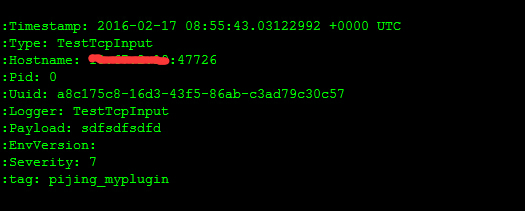对于heka的消息流向,我们都知道如下:
input--->splitter--->decoder--->router--->filter--->output
其中output可以配置encoder,encoder决定了输出的消息是什么样子的。
heka中内置了一个很好用的encoder,叫做RstEncoder,它展示消息时是按key:value方式展示的。
如下就是一个RstEncoder格式的output输出:
:Timestamp: 2016-02-15 07:11:29.232551585 +0000 UTC
:Type: TestTcpInput
:Hostname: [ip]:29093
:Pid: 0
:Uuid: d178f24b-d967-46ab-801e-d3383b8ff5bf
:Logger: TestTcpInput
:Payload: sdfsdfsdfsdfsdfsdfsdfsdfsdfsdfsdfsdfsdfsdfsdfsdfsdfsdfsdfsdfsdfsdfsdfsdfsdfsdfsdfsdfsdfsdf
:EnvVersion:
:Severity: 7
我们编写的插件就在RstEncoder的基础上稍微修改一下,为它增加一个key:value:
re.writeAttr(buf, "tag", "pijing_myplugin")
然后在heka-dev中新建externals目录,在下面新建myplugin目录,将myplugin_encoder.go文件放进去。
接着再在heka-dev/cmake目录下新建plugin_loader.cmake文件,内容为:
add_external_plugin(git https://github.com/bellycard/myplugin :local)
其中url中的"myplugin"就是我们的自定义插件所在目录,而:local则表明它在编译时先从externals目录中找寻该插件,找不到再通过url下载。
最后再cd到heka-dev的根目录下,运行./build.sh
可以看到在编译过程中,已经将我们的自定义插件编译进去了。
接着用编译好的heka-dev/build/heka/bin/hekad文件替换掉heka/bin下的hekad文件,接着修改hekad.toml文件,类似于下:
[MyPluginEncoder]
[TestTcpInput]
type = "TcpInput"
address = "[ip]:55555"
decoder = ""
splitter = "NullSplitter"
[TestTcpOutput]
type = "KafkaOutput"
message_matcher = "Logger == 'TestTcpInput' && (Hostname=~/^[ip]:/)"
topic = "heka_test"
addrs = ["[ip]:9092","[ip]:9092"]
encoder = "MyPluginEncoder"
input--->splitter--->decoder--->router--->filter--->output
其中output可以配置encoder,encoder决定了输出的消息是什么样子的。
heka中内置了一个很好用的encoder,叫做RstEncoder,它展示消息时是按key:value方式展示的。
如下就是一个RstEncoder格式的output输出:
:Timestamp: 2016-02-15 07:11:29.232551585 +0000 UTC
:Type: TestTcpInput
:Hostname: [ip]:29093
:Pid: 0
:Uuid: d178f24b-d967-46ab-801e-d3383b8ff5bf
:Logger: TestTcpInput
:Payload: sdfsdfsdfsdfsdfsdfsdfsdfsdfsdfsdfsdfsdfsdfsdfsdfsdfsdfsdfsdfsdfsdfsdfsdfsdfsdfsdfsdfsdfsdf
:EnvVersion:
:Severity: 7
我们编写的插件就在RstEncoder的基础上稍微修改一下,为它增加一个key:value:
re.writeAttr(buf, "tag", "pijing_myplugin")
具体代码如下(myplugin_encoder.go):
/***** BEGIN LICENSE BLOCK *****
# This Source Code Form is subject to the terms of the Mozilla Public
# License, v. 2.0. If a copy of the MPL was not distributed with this file,
# You can obtain one at http://mozilla.org/MPL/2.0/.
#
# The Initial Developer of the Original Code is the Mozilla Foundation.
# Portions created by the Initial Developer are Copyright (C) 2014
# the Initial Developer. All Rights Reserved.
#
# Contributor(s):
# Rob Miller (rmiller@mozilla.com)
#
# ***** END LICENSE BLOCK *****/
package plugins
import (
"bytes"
"encoding/base64"
"fmt"
"github.com/mozilla-services/heka/message"
"github.com/mozilla-services/heka/pipeline"
"strconv"
"strings"
"time"
)
// MyPluginEncoder generates a restructured text rendering of a Heka message,
// useful for debugging.
type MyPluginEncoder struct {
typeNames []string
}
func (re *MyPluginEncoder) Init(config interface{}) (err error) {
re.typeNames = make([]string, len(message.Field_ValueType_name))
for i, typeName := range message.Field_ValueType_name {
re.typeNames[i] = strings.ToLower(typeName)
}
return
}
func (re *MyPluginEncoder) writeAttr(buf *bytes.Buffer, name, value string) {
buf.WriteString(fmt.Sprintf(":%s: %s\n", name, value))
}
func (re *MyPluginEncoder) writeField(buf *bytes.Buffer, name, typeName, repr string,
values []string) {
isString := typeName == "string"
buf.WriteString(fmt.Sprintf(" | name:\"%s\" type:%s value:", name, typeName))
var value string
if len(values) == 1 {
value = values[0]
if isString {
value = fmt.Sprintf("\"%s\"", value)
}
buf.WriteString(value)
} else {
var i int
buf.WriteString("[")
for i, value = range values {
if i > 0 {
buf.WriteString(",")
}
if isString {
value = fmt.Sprintf("\"%s\"", value)
}
buf.WriteString(value)
}
buf.WriteString("]")
}
if repr != "" {
buf.WriteString(fmt.Sprintf(" representation:\"%s\"", repr))
}
buf.WriteString("\n")
}
func (re *MyPluginEncoder) Encode(pack *pipeline.PipelinePack) (output []byte, err error) {
// Writing out the message attributes is easy.
buf := new(bytes.Buffer)
buf.WriteString("\n")
timestamp := time.Unix(0, pack.Message.GetTimestamp()).UTC()
re.writeAttr(buf, "Timestamp", timestamp.String())
re.writeAttr(buf, "Type", pack.Message.GetType())
re.writeAttr(buf, "Hostname", pack.Message.GetHostname())
re.writeAttr(buf, "Pid", strconv.Itoa(int(pack.Message.GetPid())))
re.writeAttr(buf, "Uuid", pack.Message.GetUuidString())
re.writeAttr(buf, "Logger", pack.Message.GetLogger())
re.writeAttr(buf, "Payload", pack.Message.GetPayload())
re.writeAttr(buf, "EnvVersion", pack.Message.GetEnvVersion())
re.writeAttr(buf, "Severity", strconv.Itoa(int(pack.Message.GetSeverity())))
re.writeAttr(buf, "tag", "pijing_myplugin")
// Writing out the dynamic message fields is a bit of a PITA.
fields := pack.Message.GetFields()
if len(fields) > 0 {
buf.WriteString(":Fields:\n")
for _, field := range fields {
valueType := field.GetValueType()
typeName := re.typeNames[valueType]
var values []string
switch valueType {
case message.Field_STRING:
values = field.GetValueString()
case message.Field_BYTES:
vBytes := field.GetValueBytes()
values = make([]string, len(vBytes))
for i, v := range vBytes {
values[i] = base64.StdEncoding.EncodeToString(v)
}
case message.Field_DOUBLE:
vDoubles := field.GetValueDouble()
values = make([]string, len(vDoubles))
for i, v := range vDoubles {
values[i] = strconv.FormatFloat(v, 'g', -1, 64)
}
case message.Field_INTEGER:
vInts := field.GetValueInteger()
values = make([]string, len(vInts))
for i, v := range vInts {
values[i] = strconv.FormatInt(v, 10)
}
case message.Field_BOOL:
vBools := field.GetValueBool()
values = make([]string, len(vBools))
for i, v := range vBools {
values[i] = strconv.FormatBool(v)
}
}
re.writeField(buf, field.GetName(), typeName, field.GetRepresentation(),
values)
}
}
buf.WriteString("\n")
return buf.Bytes(), nil
}
func init() {
pipeline.RegisterPlugin("MyPluginEncoder", func() interface{} {
return new(MyPluginEncoder)
})
}然后在heka-dev中新建externals目录,在下面新建myplugin目录,将myplugin_encoder.go文件放进去。
接着再在heka-dev/cmake目录下新建plugin_loader.cmake文件,内容为:
add_external_plugin(git https://github.com/bellycard/myplugin :local)
其中url中的"myplugin"就是我们的自定义插件所在目录,而:local则表明它在编译时先从externals目录中找寻该插件,找不到再通过url下载。
最后再cd到heka-dev的根目录下,运行./build.sh
可以看到在编译过程中,已经将我们的自定义插件编译进去了。
接着用编译好的heka-dev/build/heka/bin/hekad文件替换掉heka/bin下的hekad文件,接着修改hekad.toml文件,类似于下:
[MyPluginEncoder]
[TestTcpInput]
type = "TcpInput"
address = "[ip]:55555"
decoder = ""
splitter = "NullSplitter"
[TestTcpOutput]
type = "KafkaOutput"
message_matcher = "Logger == 'TestTcpInput' && (Hostname=~/^[ip]:/)"
topic = "heka_test"
addrs = ["[ip]:9092","[ip]:9092"]
encoder = "MyPluginEncoder"
即output使用MyPluginEncoder,接着用tcp client向55555端口发送数据,即可以看到kafka的heka_test topic已经收到了数据:























 4516
4516

 被折叠的 条评论
为什么被折叠?
被折叠的 条评论
为什么被折叠?








